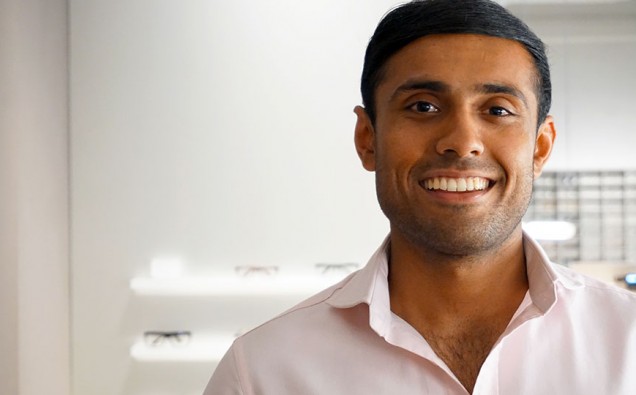- You have a degree in Optometry and have released a new International product that protects technology users from harmful blue light emitted from digital screens. What inspired your passion for eye-care and made you want to go into this particular field?
I was always interested in Biology from a young age and naturally excelled in that subject. I enjoy helping people and healthcare is an environment where you can do that quite well. At the time I was exploring options through Dentistry, Medicine, and similar avenues. I did a shadow day at Specsavers, followed by working a week there. My learning at the placement was quite tangible; I could understand what I was doing and the industry itself well. I thought I could see myself in the role and decided to pursue Optometry as the career I wanted to embark on.
- Tell us more about Ocushield, how does it act as a barrier to protect people’s eyesight and help them go to sleep at night? How is it different from a normal screen protector and privacy guard?
Blue light also stops the release of melatonin in our bodies (the sleep regulating hormone). Ocushield uses specialised formulation within the material of glass, which absorbs most of the blue light that is omitted from digital screens, and protects our eyes. A typical screen or privacy protector doesn’t do this. At Ocushield we position ourselves as more of a healthcare company rather than just selling mobile accessories. Medical authorities in the UK have actually credited our product as doing its job correctly and as safe to market, which is something we’re very proud of.
- Is Ocushield really necessary, won’t turning your device’s brightness down or putting night shift on protect your eyes just as well?
One of the reasons customers love our product is because of its uniqueness. Many software companies will build in a blue light emitting setting into their operating system, which will make your screen go orange or have a yellowish tinge. Whereas Ocushield does not do that, your image will always be very clear and vibrant. A lot of parents also use our product because they know their children are very tech-savvy and will turn the blue-light protection software of. But with our Ocushield screen guards they know their children will always be protected.
- How did you fund the costs and man-power required to launch Ocushield when you were still a student, and how did you manage to dedicate so much of your time to the project while you were still at university?
Whilst I was at university there was a Business competition where I submitted my product. I was fortunate enough to wow the judges; show them I’d be able to make the product and that there would be a market for it. I used the money I won from the contest to fund Ocushield and a partial amount of my student loan to set the business up. I knew that the company would require a lot of my time but I was dedicated enough to make it work.
- What has the customer response been so far to your product and were people surprised with the amount of sales you’ve made?
When the product first came out I was quick to get a website up, even though production wasn’t full in flow yet. We started accepting pre-orders before launch at the start of 2015, with 500+ people signed up. The response was good; we sold over 50,000 units of Ocushield world-wide. People were seeing the benefits of the product, not just consumers but employers for example who want to protect their workers on the job, and it’s been great.
- What devices is Ocushield available for, as well as smart phones and laptops, does it also fit kindles and various tablets?
At the moment a lot of our products cater for the Apple market; Macbooks, iPhones and iPads. We also provide for a lot of monitors and laptops. Currently we don’t supply for Kindles but we are looking our expand our product range within the next year. We also have glasses that reduce blue light if you want protection from a device that Ocushield currently do not market for yet.
- Which countries is Ocushield available in, have you ever thought about making the product available at local technology retailers like Curry’s PC World and Carphone Warehouse for example?
We currently sell to Canada, Australia, New Zealand, and Singapore. We will be launching in 3 Mobile Store in December this year, and will be advising retailers on how to sell our product in store so customers have the full information and the product is distributed well to the public.
- You are donating £1 of every Ocushield sales you make to the charity Fight for Sight. Can you comment more about the important healthcare work they do and why you chose to support them?
Fight For Sight is the leading eye care charity in the UK. They do pivotal research for the future of eye care in our country. In terms of statistics, we are in a generation where problems such as glaucoma and cataracts are on the rise. There is not enough being done into looking for medical solutions to these conditions and eye sight loss in general. That’s where Fight For Sight come in, and their work focuses on prevention and not just cures for such conditions.
- Following the investment in your business from Asad Hamir, who is an optician like yourself, Ocushield is expected to make a £1 million turnover in its 3rd year since it was founded. Did you ever think to achieve so much success when you first released the product?
When I first launched the product I wasn’t thinking ahead on a long-term basis for the future of the company. I was acting on a short-term basis as I knew I just had to release the product quickly for my first band of customers. I had never imagined Ocushield would have this wide of a range. The £1 million turn over that’s a great milestone for us, but it’s only the start as we know there are so many areas we can grow the business in.
- Your business has further plans for the range including blue light limiting light bulbs & prescription lens coatings, are there any other products you’re hoping to add to the range? Where do you hope to see the business progress to in the next few years?
That’s right, and we want to think about lighting as a whole. A lot of lighting currently is LED in offices and homes, which emits more blue light than digital screens. These types of rays can cause tiredness in our eyes, headaches and loss of sleep. We’re going to be looking at new limiting light bulbs and desk lamps we can produce to stop this. We also want to sell our product to more stores offline, banks and large business groups, then see where our business can grow from there.
Manisha Bhanot.

















